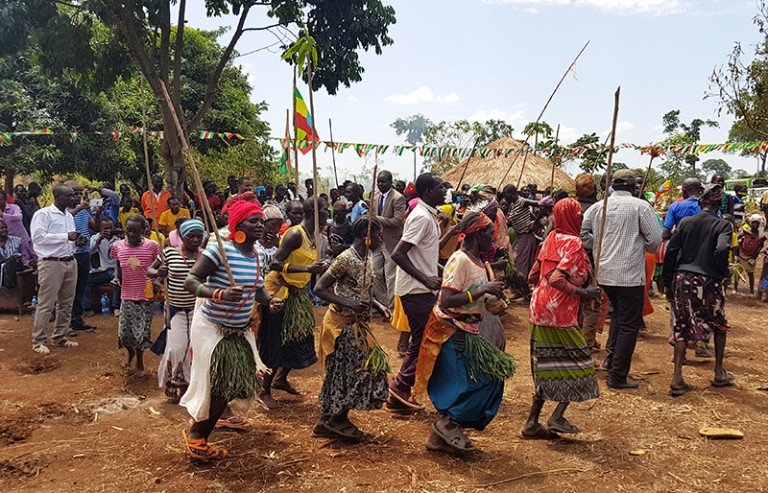Feature
In Ethiopia, forest communities' voices heard loud and clear
In 2010, during the USAID-funded Cultural Dialogue Initiative project, Pact’s Ethiopia team supported eight kebeles, or villages, to establish participatory forestry management frameworks, including signed agreements with local authorities, meant to help preserve local forests. Nevertheless, a foreign investor made a land grab. Community members protested the takeover, as they were supposed to have control over local forests under the agreements. But their resistance didn’t work. Some community members were killed in clashes, while others were imprisoned for months. It was a devastating loss.
Seven years later, Pact is continuing its conservation work in the region through the USAID-funded Godere Forest Initiative (GOFORI), bringing three new kebeles into the fold: Kumi, Gelesha and Gonchi. GOFORI has engaged government authorities and experts at all levels in implementing the project, as well as community members.
The project is reducing conflict related to natural resources, helping communities to manage and sustain local natural ecosystems and benefit from natural resources while coexisting peacefully. Pact is building the capacity of forest cooperatives and providing opportunities for different groups to come together to address underlying causes of tension. This means more equitable access to economic resources, improved forest management systems and increased space for dialogue among groups – ultimately leading to increased local capacity to prevent and manage natural resource-driven conflict. GOFORI also provides community trainings on how to build livelihoods from non-timber forest products, such as honey and forest-friendly spices.
After the demarcation of forest resources and the development of forest management plans, newly formed forest cooperatives signed agreements with local government officials during a hand-over ceremony where authority to co-manage the forests was vested in community members. Coinciding with International Day of Forests, the ceremony helped highlight the great strides communities had made in assuming the role of forest co-managers, which helped build support among all stakeholders. Attendees included regional cabinet members, technical experts, various standing committees of the Regional Council, and the deputy house speaker of Ethiopia’s Gambella region. Officials acknowledged the importance of GOFORI’s support to the communities and gained a better understanding of the value of the forests – not only as engines of macroeconomic development but as drivers of community engagement and development and purveyors of ecosystem services to thousands of Ethiopians.
Vested interests at play
Large swathes of land in Gambella have been classified as ripe for agricultural investments, including coffee, cotton and tea. Some of this land, however, is protected forest.
In Gelesha and Gonchi, a domestic private investor claimed 3,000 hectares of forested land that had already been demarcated to be co-managed by forest cooperatives in the kebeles. The company planned to convert it to rain-fed maize and rice. Forest cooperatives in Gelesha managed to stave off the transfer of 2,000 hectares to the company. But for those in Gonchi, the harrowing clashes in 2010 were still fresh in their memories, so the forest cooperatives were not able to resist pressure from the investor and pro-investor district authorities. Having caught wind of a future forest handover, the investor began opening roads into the 2,000 hectares of forested land in earnest to clear the land and harvest the timber before any objections or resistance could be mounted.

The move exposed divergent views among government authorities, with the chief administrators at the district and zone levels supporting the company and the heads of the agriculture offices at both levels denouncing its actions as illegal. But then a higher authority intervened. The regional vice president ordered the zone chief administrator to stop all forest clearance by the company. His decision was influenced in large part by officials in the regional government who had gotten a firsthand look at the importance of the forests to local communities during the International Forest Day celebration and hand-over ceremony supported by GOFORI.
After the regional vice president’s decision to stop the forest clearance in Gonchi, the investor complained to the regional president. A committee formed to investigate the case discovered that district authorities had leased the land to the investor without having involved local stakeholders. The committee learned that community members were forced by both district authorities and the investor into giving up the land, even though it had been demarcated to be co-managed by the forest cooperatives and local authorities.
The committee ultimately agreed with the ban on forest-unfriendly investment in the area and ordered district and zonal authorities to look for more suitable, non-forested land.
The Gambella regional state government ultimately listened to the voices of the forest cooperatives and local communities. Pact, through the GOFORI project, has given communities and authorities the capacity to manage their forests in a participatory manner. Ethiopians now have a powerful say in the sustainable development of their forested land. They have the tools they need to develop vibrant communities that are thriving and economically prosperous.